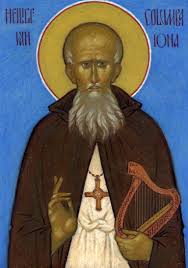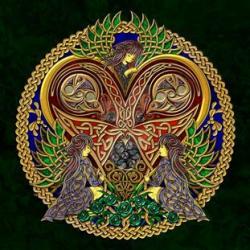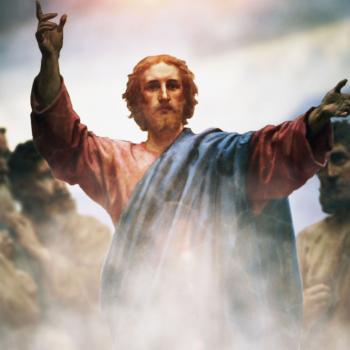 Typically, when we discuss saints in the liturgical setting, we are speaking about people that are close to perfect. These are people who have surrendered their entire life to Christ. In many cases these amazing people have done amazing things. They have helped countless numbers of people. After all, they are saints of the church, they could do no wrong. But because they are considered so close to perfect, they sometimes seem inaccessible or even too good to be true.
Typically, when we discuss saints in the liturgical setting, we are speaking about people that are close to perfect. These are people who have surrendered their entire life to Christ. In many cases these amazing people have done amazing things. They have helped countless numbers of people. After all, they are saints of the church, they could do no wrong. But because they are considered so close to perfect, they sometimes seem inaccessible or even too good to be true.
This is simply not the case with Columba. What we find in Columba is a person who has grievously hurt others and will spend a lifetime trying to right a wrong. Saint Columba is so attractive to me because Columba was human. His whole story is told, mistakes and all. I believe today we do not need a perfect example of piety; we need an example of humanity. An example of a person who commits error, owns it, and spends the rest of their life correcting it. This is a story the world needs. This is the story of Saint Columba of Iona.
Good Christian Boy
Columba was born a prince in Donegal, Ireland around 521AD. Legend has it that Columba’s mother had a dream of a long cloak stretching out. This was taken to me Columba’s teachings would spread across Scotland and Ireland. As a child, he grew up a Christian in a Christian household. In his teenage years he was accepted into a monastery and took the name Columcille which translates “Dove of the Church.”
At this point we can see a man who had everything going for him as a child. He had the money, family and Jesus that many Christian kids grow up with. He was the quintessential suburban Christian kid who grows up in the church. Everyone just knows he is growing up to be a pastor, and then he gets into seminary. Columba was a “good Christian boy”.
The Good Christian Boy Becomes a “Megachurch Pastor”
Things appear to be going great in seminary for Columba, as he begins to found churches. He founds his first monastery at the age of 25 in Derry, Ireland. Imagine being a 25-year-old, fresh out of seminary, and founding a successful church. Columba also had clearly taken on the missionary style of Patrick as he founded his church on an ancient Druidic site that the people already associated as a holy place. He then begin to found churches all over Ireland, founding over 300 in Ireland and Scotland in his lifetime. As a young man he had become the Billy Graham of his time. This guy was clearly something special. But this would not last forever, and some serious mistakes would soon be made.
Pride Goeth Before the Fall
Columba was likely well liked and very popular given his pedigree and ability to found monasteries. He was likely a Donegal celebrity. But soon, choices that Columba made would bring about ruin to his reputation. In his forties, He copied a psalter from another monk’s work and then claimed it as his own. This is basically forgery and copyright infringement today. A massive argument over its legitimate owner broke out and it was ruled Columba was in the wrong, and the copyright was awarded to the monk.
What happened next would shape Columba and his trajectory of missionary work. Columba had a temper and even other monks had described him as difficult to work with. But this time the rage got the better of him. As a prince he had access to an army, which he called upon. A battle then ensued that was more like a massacre where hundreds, possibly thousands were killed because of Columba’s rage.
A Life in Exile
In short, Columba killed many people, likely Christians and monks, because he did not get his way. How great this fall must have been. After this genocide, Columba was horrified because of what he had caused. Columba decided on a self-imposed exile away from his homeland. He declared that he would convert as many as he had caused to die as his penance. He went away from his homeland, not stopping until he could no longer see the place, he had called home.
One might say this was a meteoric fall from where he had started. He was responsible for a massacre. He went from being the very example of a good “Christian” boy to being sent away in disgrace. In the modern era, this is the place where these stories end. This is where the modern pastor hides in disgrace for their actions and are never heard from again. I would argue they hide not because they are remorseful, but because people know. Its like when a person says they are sorry, we must ascertain the reason. Are you sorry because you got caught or sorry for the damage you have done? On Iona, we discover exactly which Columba was. Its not the words that show remorse, it’s the actions. This is just as true today as it was then.
On Iona
He established his home base on Iona and immediately went about the business of his penance. He travelled the area converting kings and kingdoms. But what is most striking about this exile is that Columba also made it his business to convert commoners which was irregular. Normally the missionary would convert the leader and the leader would go about the business of converting the kingdom. But Columba did both, bringing Christianity to the area around Iona at a fast pace. He very quickly became a man of respect and renown on Iona. Although it seems clear he never really got over what had happened in Donegal, he made it his life’s work to repair the damage.
What Columba Can Teach Us
We live in an era where many pastors have caused great hurt and damage in the Kingdom of God. From verbal abuse to rape and beyond. When these things occur, what do we do with the leaders? Columba gives us our first lesson here. Leaders must step down and away from the ministry. It is true Jesus will forgive all sin, but that does not mean you should retain power or shepherding responsibilities of a church. Leaders must be held accountable, both by law and by Christian standards. If what they did is illegal, they should serve whatever punishment is afforded by the state. If what they did is immoral, they should follow Columba’s lead and step down and step away.
Secondly, Columba teaches us about true repentance. True repentance is not saying “I’m Sorry”, true repentance is saying I am Sorry and making it your life’s work to repair the damage. Too many times we want to give an apology and move on, but that is not forgiveness. For the sake of the victims, we must sit in the moment and not only say sorry but be sorry and act to restore.
Lastly, Columba teaches us there may not be a happy ending. Columba never returned to Donegal. There was no prodigal son like moment where all was forgiven, and Columba returned to former glory. That ending is a fairy tale. The truth is Columba never fully got over what had happened at worked his whole life to repair the damage.
Discipline is the Side of Love No One Talks About
This is a lesson for pastors who have abused. The truth is, you will never get what you had back if you are truly repentant. It doesn’t mean you cannot be used in the kingdom, but it does mean you will never (or should never) be in the position you were. It is true God can still bless those who have made colossal mistakes. But no where is it written you will return to where you were. God has said that you would be saved from your sins, no where is it written that you will not serve the earthly consequences of your actions. And it falls to the church to ensure that those that hurt, or abuse are removed from these positions.
Part of love is discipline and removing someone from a position where they have hurt people is love; love for those who could be hurt by allowing the minister to stay.
To learn more about Celtic Christianity, click here











